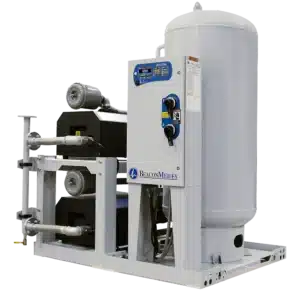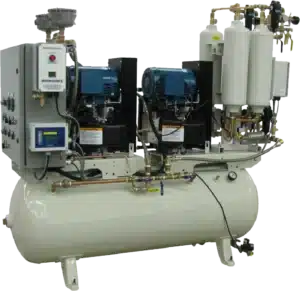New installations must be verified:
Medical gas verification is an essential process that ensures the safety and efficacy of medical gas systems in healthcare facilities. It involves a series of tests and inspections that verify the performance, reliability, and compliance of medical gas systems, such as oxygen, nitrogen, and carbon dioxide delivery systems.
At its core, medical gas verification aims to ensure that medical gas systems are installed, maintained, and operated correctly, minimizing the risk of gas leaks, contamination, and other potential hazards. This is crucial for patient safety and regulatory compliance, as non-compliant gas systems can compromise the quality of care and expose healthcare facilities to penalties and legal liabilities.
All new installations must be Verified by an ASSE 6030 verifier. Medical gas verifiers are there to make sure that your installation was done properly and that there are no immediate or long-term concerns you have to worry about. These include checking pipes and plumbing for proper installation and code compliance. Verifiers are required to make sure zone valves, alarm panels, medical gas outlets and other equipment within the system are functioning properly. These testing procedures ensure that you have all the proper equipment you need to do your job successfully.
The National Fire Protection Association (NFPA) 99 standard outlines the requirements for the installation, testing, and maintenance of medical gas systems in healthcare facilities. As part of the verification process, a medical gas verifier must perform several tests to ensure the system’s safety and efficacy. Here are some of the tests that may be performed by an NFPA 99 medical gas verifier:
- Oxygen purity testing: Oxygen is a critical component of medical gas systems, and it must meet purity standards to ensure it is safe for patient use. The verifier will test the oxygen purity using a specialized analyzer and ensure it meets the NFPA 99 standards.
- Medical air testing: Medical air is used in a variety of medical procedures and must be free of contaminants and meet certain purity standards. The verifier will test the medical air using specialized equipment and ensure it meets the required standards.
- Nitrous oxide purity testing: Nitrous oxide is a commonly used anesthetic gas in medical facilities, and its purity must be verified to ensure patient safety. The verifier will test the nitrous oxide using a specialized analyzer and ensure it meets the required purity standards.
- Pressure testing: The verifier will test the pressure of the medical gas system to ensure it meets the required specifications. This includes testing the pressure of the pipelines, regulators, and other components.
- Flow rate testing: The flow rate of medical gases is critical for patient safety and must be verified to ensure it meets the required specifications. The verifier will test the flow rate of the medical gas system using specialized equipment and ensure it meets the required standards.
- Leakage testing: The verifier will inspect the medical gas system for leaks, including pipelines, valves, and regulators. Any leaks will be identified, and repairs will be recommended to ensure the system is safe for patient use.
Overall, NFPA 99 medical gas verifiers perform a range of tests to ensure medical gas systems in healthcare facilities are safe, reliable, and comply with regulatory standards. By working with a reputable medical gas verification provider, healthcare facilities can ensure their medical gas systems meet the required standards and provide the highest level of patient care.
You can get a quick quote by calling us at 1+(844) 768-5744, or by using the form to your right.
-
Annual Inspections after verification:
After your installation and verification, an annual inspection must be conducted to ensure that your new med gas installation and equipment is functioning properly. Also, we offer discounts on Annual Inspections, products, and gas delivery when you become a lifetime member.
-
Common Questions:
What’s The Cost: Cost varies by facility size, but we can usually give you an estimate over the phone, just call 1+(844) 768-5744 or fill out the call back form on this page.
When can we do it: If you need an emergency medical gas verification and can’t find anyone else to do it the time you need, we’ll be happy to get it done. Just call 1+(844) 768-5744 or fill out the call-back form on this page and we’ll be there when you need us.
What do we need to know before we do it: Scroll down to our verification checklist for important information on how to prepare for your verification.

 What’s The Cost: Cost varies by facility size, but we can usually give you an estimate over the phone, just call
What’s The Cost: Cost varies by facility size, but we can usually give you an estimate over the phone, just call  When can we do it: If you need an emergency medical gas verification and can’t find anyone else to do it the time you need, we’ll be happy to get it done. Just call
When can we do it: If you need an emergency medical gas verification and can’t find anyone else to do it the time you need, we’ll be happy to get it done. Just call  What do we need to know before we do it: Scroll down to our verification checklist for important information on how to prepare for your verification.
What do we need to know before we do it: Scroll down to our verification checklist for important information on how to prepare for your verification.








